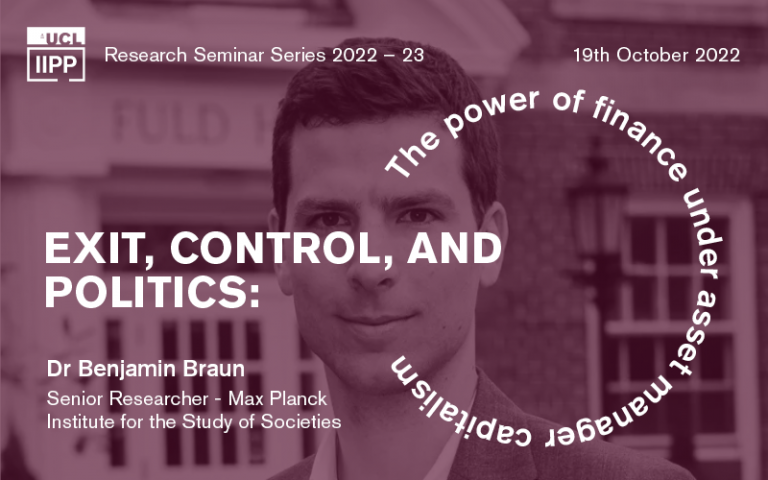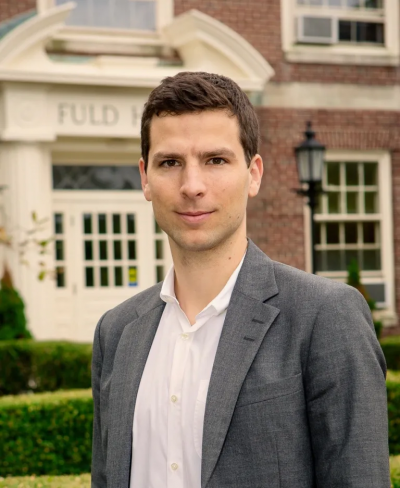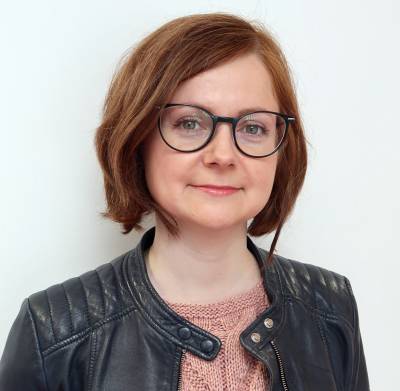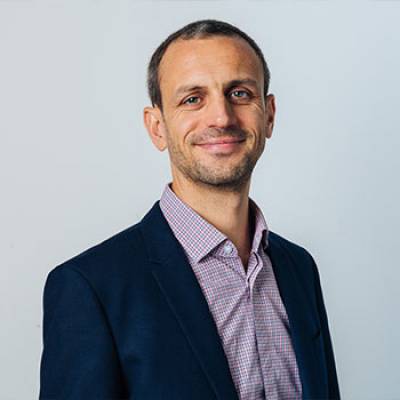Exit, control, and politics: The power of finance under asset manager capitalism
19 October 2022, 5:00 pm–6:30 pm

Join us to hear Dr Benjamin Braun, Senior Researcher at the Max Planck Institute for the Study of Societies discuss his research on 'Exit, control, and politics: Structural power and corporate governance under asset manager capitalism'. This talk is convened by Dr Carolina Alves and will be chaired by IIPP’s Dr Josh Ryan-Collins, with Dr Olga Mikheeva as discussant, followed by questions from the audience.
This event is free.
Event Information
Open to
- All
Availability
- Yes
Cost
- Free
Organiser
-
IIPP Comms
This seminar will take place from 17:00-18:30 (GMT) UK Time
In this talk, Benjamin Braun will focus on the ongoing evolution of the structural power of finance, drawing upon his latest research 'Exit, control, and politics: Structural power and corporate governance under asset manager capitalism'. Macroeconomic developments and financial innovations have reduced financial actors’ exit options, thus diminishing exit-based structural power, traditionally associated with banks and institutional investors. At the same time, shareholdings have become more concentrated in the hands of large asset managers, thus increasing control-based power. The talk documents these countervailing trends, before turning to the question of whether, and to what ends, asset managers wield this power. Why, despite being fully diversified universal shareholders, have they not steered corporate behavior towards decarbonization and environmental sustainability? Rather than assuming orderly, good-faith interactions between shareholders and managers, this article argues that in the United States today, political considerations govern the use of control-based power. Asset managers’ corporate governance policies are subservient to the—increasingly inconsistent—goals of maximizing assets under management while avoiding regulatory backlash. They seek to perform as much environmental and social stewardship as necessary to satisfy blue-state pension funds and federal regulators, while saying and doing as few “green” things as possible that can be weaponised by red-state pension funds and politicians.
Join us to hear Dr Benjamin Braun, political scientist at the Max Planck Institute for the Study of Societies discuss his latest research. This talk is convened by Dr Carolina Alves and will be chaired by Dr Josh Ryan-Collins with Dr Olga Mikheeva as discussant. Followed by questions from the audience.
- Presenter: Dr Benjamin Braun
- Discussant: Dr Olga Mikheeva
- Chair: Dr Josh Ryan-Collins
- Convenor: Dr Carolina Alves
Material linked to this seminar
- Braun, B. (2021). Exit, control, and politics: The structural power of finance under asset manager capitalism. https://doi.org/10.31235/osf.io/4uesc
About the Speakers
Benjamin Braun
Senior Researcher at Max Planck Institute for the Study of Societies in Cologne

Dr Olga Mikheeva
Research Fellow in Public Banking at UCL Institute for Innovation and Public Purpose

Outside the IIPP, Olga is coordinating Research Area on Monetary Economics, Finance and Financial Institution atthe European Association of Evolutionary Political Economy (EAEPE) where she also served as a member-elect of the EAEPE Council during 2017-2020. She is also a regular peer reviewer in a number of academic journals in heterodox economics, economic development and innovation, and political economy. In addition, Olga is a trustee in the Foundation for European Economic Development (FEED) and a member of the London Political Economy Network (LPEN). During 2017-2019, she acted as the coordinator of the Economics of Innovation Working Group at the Institute for New Economic Thinking (INET) Young Scholars Initiative (YSI).
Prior to joining the IIPP, Olga worked in policy evaluation and advisory field as a senior expert in Technopolis Group, a consultancy firm specializing in STI policies and a former spin-off from SPRU (University of Sussex). During this time Olga contributed to theory-based evaluations of STI policies; to the spatial/regional analysis of industrial and digital transformation; to the development of a national Circular Economy methodology; and supported the development and evaluation of international STI and cross-border cooperation programs.
More about Dr Olga MikheevaDr Josh Ryan-Collins
Associate Professor in Economics and Finance at UCL Institute for Innovation and Public Purpose

Josh has been at UCL since 2017 and has been Head of Research for IIPP and is currently Departmental Graduate Tutor (Director of the PhD program). He is a council member of the Progressive Economy Forum, a think tank of made up of eminent economists advocating for improved macroeconomic policy in the UK. Previously Josh was a Senior Economist and Head of the Finance program with the New Economics Foundation (NEF), one of the UK’s leading progressive think tanks. He was also a founding member of the Brixton Pound local currency.
Josh has a Ph.D. in finance and economics from the University of Southampton Business School, a MA in Industrial relations from Warwick University Business School and a BA in Sociology, also from Warwick.
Josh is an economist with a research focus on macroeconomic policy, housing and land and sustainable finance. His has a particular interest in credit and land, two concepts that have been neglected in conventional economics but which, because of their unique properties, play a vital role in shaping the trajectory of capitalist economies.
His co-authored book Where Does Money Come From? (2011, New Economics Foundation) was the first comprehensive guide to the workings of a modern capitalist monetary system (the UK). The book helped establish the role of commercial banks in the money creation process and is used as a textbook to teach banking in the UK and US.
More about Dr Josh Ryan-CollinsDr Carolina Alves
Head of Research and Associate Professor in Economics at UCL Institute for Innovation and Public Purpose
Carolina specialises in macroeconomics and international political economy, with regional expertise in Latin America.
Carolina joins IIPP from Girton College at the University of Cambridge where she was the Joan Robinson Research Fellow in Heterodox Economics and a College Teaching Officer at the Faculty of Economics. At Cambridge, she led teaching in macroeconomics, political and social aspects of economics, and history and philosophy of economics, while also being the Director of Studies for Economics for second-year undergrads, and a member of Girton’s College Council responsible for the stewardship of the College.
Carolina is the co-founder of Diversifying and Decolonising Economics – a network of economists working to promote inclusiveness in economics in both the academic content and the field’s institutional structures. She is a member of the Rebuilding Macroeconomics Advisory Group - a research initiative aimed at re-invigorating macroeconomics and bringing it back to the fore as a policy-relevant social science, as well as being the co-editor for the Developing Economics blog, which takes a critical approach to creating discussion and reflection in the field of economics. She is also a board member on the Progressive Economy Forum Council (PEF) and Positive Money.
 Close
Close

